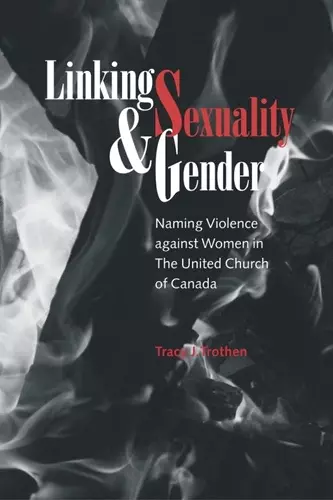Linking Sexuality and Gender
Naming Violence Against Women in the United Church of Canada
Format:Paperback
Publisher:Wilfrid Laurier University Press
Published:30th May '03
Currently unavailable, and unfortunately no date known when it will be back

Why did it take so long for the United Church of Canada to respond to violence against women?
Tracy J. Trothen looks at the United Church as a uniquely Canadian institution, and explores how it has approached gender and sexuality issues. She argues that how the Church deals with these issues influences its ability to name violence against women.
In examining the Church's early approaches to gender and sexuality, Tracy J. Trothen discovered that the United Church had tended to see certain structures or roles as sacred and others as demonic. For example, while sex outside marriage was bad or improper, sexual expression within marriage was largely deemed as proper or good, no matter what manifestation it took. This assumption allowed much violence within families and marriages to go unchallenged.
Trothen uncovers significant shifts in this approach through the examination of such issues as redemptive homes, marriage, pornography, abortion, the ordination of women, and family. Then, analyzing three recent case studies, she demonstrates the value of women's voices in challenging dominant world views. Finally, she suggests how the Church's approach to human sexuality and gender has facilitated or obstructed the move to address violence against women.
The findings in Linking Sexuality and Gender can be applied to faiths outside the United Church and will be important to anyone interested in church and society, sexuality, gender, or the causal dynamics behind one Canadian institution's response to violence against women.
Tracy J. Trothen is an assistant professor of systematic theology and ethics, and director of field education at Queen's Theological College, Queen's University, Canada. She was ordained in the United Church of Canada. Why did it take so long for the United Church of Canada to respond to violence against women?
``In her thorough examination of The United Church of Canada's view of gender and sexuality and how they intertwine with the Church's stance on violence against women, Trothen provides invaluable description and appraisal as well as crucial analytical tools that can be used to probe these issues in other contexts. This well-written book promises to be significant for anyone interested in understanding how churches might grapple with their own complicity in violence against women.'' -- Pamela Dickey Young, Head, Department of Religious Studies, Queen's University, Kingston
``Tracy Trothen provides a unique ethical study of key arenas in sexuality and social order. She digs into the archives of one religious institution, The United Church of Canada, to illumine how violence against women -- eventually, and with much struggle -- made it onto the agenda as a moral issue mandating concerted response. With a vibrant feminist approach, Trothen offers crucial resources to assess structural dynamics whereby issues of gender and sexuality, in particular male violence against women, are elided or named as ethical and theological issues. Her clear voice of advocacy admirably encourages intellectual and pastoral practices of justice-seeking as the heart of social ethics.'' -- Marilyn J. Legge, associate professor of Christian ethics,Emmanuel College, Victoria University, Toronto
``A careful examination of how one institution was able to take a courageous look at the way in which it was systematically promoting gender-based inequality and injustice through both its belief and its practices....While providing a window into the history and workings of one particular denomination, this book is worth the read even if one is not a member. Trothen's discussions of the various factors that have sustained an environment that is oppressive toward women -- a moral code that is based too much on sexual acts rather than on relationships, the dualistic thinking emerging from the spirit/body split, an over-emphasis on the preservation of family -- are worthy of serious reflection.'' -- Richard J. Gilmartin, Southdown Institute, Toronto Journal of Theology -- 200409
ISBN: 9780889204249
Dimensions: 229mm x 152mm x 11mm
Weight: 310g
232 pages